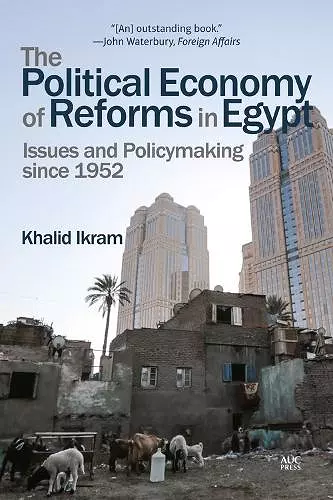The Political Economy of Reforms in Egypt
Issues and Policymaking since 1952
Format:Paperback
Publisher:The American University in Cairo Press
Published:1st Jun '21
Should be back in stock very soon

The definitive account of Egypt's economy from 1952 to the present day, new in paperback
What are the long-term structural features of the Egyptian economy? What are the factors that have facilitated or inhibited its performance? This crucial and timely work answers these questions and more by examining the most important economic decisions to have impacted the Egyptian economy since 1952 and the political factors behind them. Drawing on Khalid Ikram’s extensive knowledge of economic policymaking at the highest levels, The Political Economy of Reforms in Egypt lays out the enduring features of the Egyptian economy and its performance since 1952 before presenting an account of policy-making, growth and structural change under the country’s successive presidents to the present day. Topics covered include agrarian reforms; the Aswan High Dam; the move towards Arab socialism and a planned economy; the reversal of strategy and the infitah; fiscal, monetary, and exchange-rate policies; consumer subsidies; external debt crises; negotiations between Egypt and international donors and financial institutions; privatization; labor and employment; and poverty and income distribution. The analysis concludes with an examination of institutional reforms and development strategies to tackle the Egyptian economy’s structural problems and lay the foundation for sustained and rapid growth. Written from the point of view of a ‘participant-observer,’ this book will be indispensable to students of political economy, to scholars of Egypt and the Middle East, and to the general reader who wishes to understand, especially from the wealth of insider information provided, how domestic and international politics and economics can interact to shape decisions that promote, or prevent, economic reforms.
Khalid Ikram, a veteran scholar of Egypt’s economic development, identifies chronic symptoms of Egypt’s economic sluggishness . . . and situated them in the political history of Egypt. . . He does not present . . . insights as sweeping answers . . . , but instead frames them in a complex, but comprehensive web of analysis. * China International Strategy Review *
[B]rings a wealth of insights on the economic policy-making process, . . . a definitively valuable addition to the literature. * The Middle East Journal *
[E]asily the definitive account of Egypt’s economy over the last six decades. * Patrick Clawson, Middle East Quarterly *
Khalid Ikram has done a rare thing: written a book about economics for the general public that is easy, useful and pleasant to read. * Ursula Lindsey, Al-Fanar Media *
This book is a gem. I am fascinated by the organized compass of the author, especially the interplay between the history, economics, and politics of modern Egypt. It is poised to be a classic read for students, researchers, and practitioners alike. * Tarek H. Selim, The American University in Cairo *
This outstanding book puts Egypt’s economic history in the context of those of other developing countries, comparing it to such histories in East Asia and Latin America. Ikram skillfully weaves economic theory into his account of Egyptian economic policies over the last half century and assesses the role and effectiveness of foreign aid. * John Waterbury, Foreign Affairs *
This book is an outstanding work on several fronts. It is not only a book on the political economy of reforms in Egypt; rather it is the only book available that has tackled economic reforms in a comprehensive manner. . . . serves a wide audience, ranging from policymakers to academics to students and laymen. . . . an indispensable source. * Ahmed Ghoneim, Review of Economics and Political Science *
In this first-hand account of Egypt’s economic development over the past fifty years, Khalid Ikram cuts straight through to the deep-rooted causes for the failure to improve productivity and growth. With breadth, precision and clarity, he traces the absence of real reform back to the low level of political legitimacy accorded to the regimes in place since the 1970s and to governance more focused on political survival than on the pursuit of long-term economic growth. * Ishac Diwan, Chaire Economie Monde Arabe, Paris Sciences et Lettres *
Written by someone who has had a ringside seat for decades, this fascinating volume is an important contribution not just to the economic history of Egypt, but to the political economy of aid and development, with a surprisingly frank perspective on the role of the Bretton Woods Institutions. * Ehtisham Ahmad, University of Bonn and London School of Economics *
This book is not only a major analytical contribution toward understanding the Egyptian political economy, but also provides a template for assessing policy challenges in other developing countries, particularly in the Middle East. * Zubair Iqbal, Middle East Institute, Washington DC *
This volume provides the cogent and deeply informed analysis that Egypt’s development deserves but has rarely received. The Arab world’s largest and most populous economy has consistently failed to realize its growth potential and Khalid Ikram explains why. A must read for all those with an interest in the political calculations that underlie the making and implementing of economic policies. * Shahid Yusuf, George Washington University School of Business in Washington DC *
[A] useful resource for understanding Egypt’s economic predicaments. * The Developing Economies *
ISBN: 9789774169953
Dimensions: unknown
Weight: unknown
448 pages